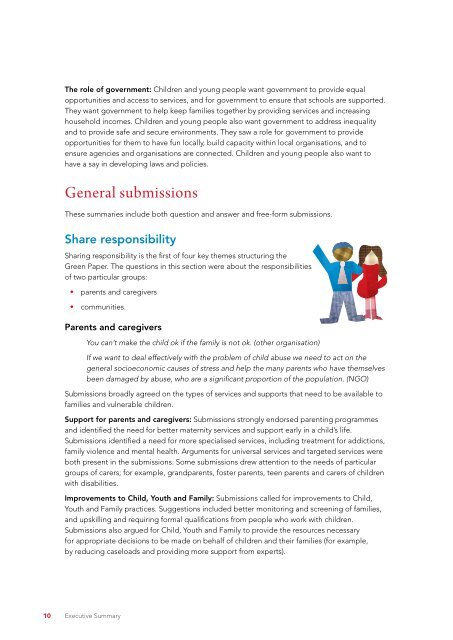The Green Paper for Vulnerable Children - Ministry of Social ...
The Green Paper for Vulnerable Children - Ministry of Social ...
The Green Paper for Vulnerable Children - Ministry of Social ...
You also want an ePaper? Increase the reach of your titles
YUMPU automatically turns print PDFs into web optimized ePapers that Google loves.
<strong>The</strong> role <strong>of</strong> government: <strong>Children</strong> and young people want government to provide equalopportunities and access to services, and <strong>for</strong> government to ensure that schools are supported.<strong>The</strong>y want government to help keep families together by providing services and increasinghousehold incomes. <strong>Children</strong> and young people also want government to address inequalityand to provide safe and secure environments. <strong>The</strong>y saw a role <strong>for</strong> government to provideopportunities <strong>for</strong> them to have fun locally, build capacity within local organisations, and toensure agencies and organisations are connected. <strong>Children</strong> and young people also want tohave a say in developing laws and policies.General submissions<strong>The</strong>se summaries include both question and answer and free-<strong>for</strong>m submissions.Share responsibilitySharing responsibility is the first <strong>of</strong> four key themes structuring the<strong>Green</strong> <strong>Paper</strong>. <strong>The</strong> questions in this section were about the responsibilities<strong>of</strong> two particular groups:• parents and caregivers• communities.Parents and caregiversYou can’t make the child ok if the family is not ok. (other organisation)If we want to deal effectively with the problem <strong>of</strong> child abuse we need to act on thegeneral socioeconomic causes <strong>of</strong> stress and help the many parents who have themselvesbeen damaged by abuse, who are a significant proportion <strong>of</strong> the population. (NGO)Submissions broadly agreed on the types <strong>of</strong> services and supports that need to be available t<strong>of</strong>amilies and vulnerable children.Support <strong>for</strong> parents and caregivers: Submissions strongly endorsed parenting programmesand identified the need <strong>for</strong> better maternity services and support early in a child’s life.Submissions identified a need <strong>for</strong> more specialised services, including treatment <strong>for</strong> addictions,family violence and mental health. Arguments <strong>for</strong> universal services and targeted services wereboth present in the submissions. Some submissions drew attention to the needs <strong>of</strong> particulargroups <strong>of</strong> carers; <strong>for</strong> example, grandparents, foster parents, teen parents and carers <strong>of</strong> childrenwith disabilities.Improvements to Child, Youth and Family: Submissions called <strong>for</strong> improvements to Child,Youth and Family practices. Suggestions included better monitoring and screening <strong>of</strong> families,and upskilling and requiring <strong>for</strong>mal qualifications from people who work with children.Submissions also argued <strong>for</strong> Child, Youth and Family to provide the resources necessary<strong>for</strong> appropriate decisions to be made on behalf <strong>of</strong> children and their families (<strong>for</strong> example,by reducing caseloads and providing more support from experts).10 Executive Summary
















